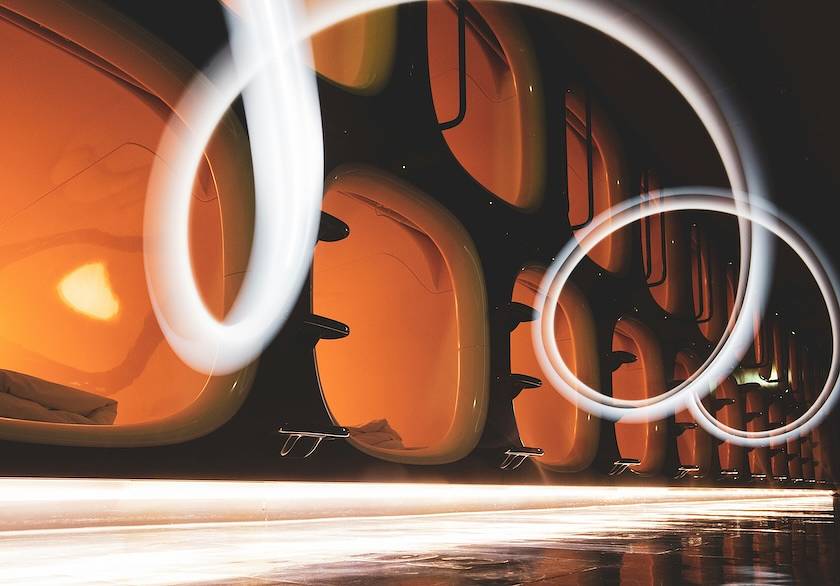Japan’s futuristic, compact and convenient sleeping pods
A capsule hotel in Japan is a budget-friendly, pod-style lodging that combines privacy with convenience. You’ll find these futuristic “sleeping pods” near major train stations in cities like Tokyo, Osaka, and Kyoto, making them ideal for solo travelers and short stays. Guests sleep in a small, enclosed capsule—about the size of a single bed—while sharing baths and lounges. Expect a quiet vibe, gender-separate floors, and prices that start well below standard hotels. Whether you need a late-night crash spot or want to try a uniquely Japanese experience, capsule hotels deliver comfort and efficiency without the high cost

Capsule Hotels: Key Details
Key Details |
What can you generally expect from a/an [Accommodation Type] |
Typical price range |
Prices typically range from ¥2,500 to ¥6,000 per night. Rates may rise to ¥6,000 to ¥8,000 in Tokyo and Osaka downtown areas, on weekends, and during major holidays (Golden Week, New Year's). |
Bathroom |
Shared bathrooms and showers are standard. Floors are usually completely separated by gender. Many facilities include a large communal bath (artificial hot spring). |
Amenities |
Free Wi-Fi, shared lounge, coin laundry, amenities like toothbrushes, towels, and slippers. Some facilities also offer breakfast, a simple kitchen, or a sauna. |
Check-in / out |
Check-in: 3:00 PM to midnight, Check-out: 10:00 AM is standard. Many facilities allow late-night check-in, but curfews or quiet hours (around 11:00 PM onwards) may apply. |
Payments |
Credit cards accepted in urban areas. Cash is often required in rural areas or smaller establishments, so carrying cash is recommended. |
Language support |
English-speaking staff are common in tourist areas like Tokyo, Osaka, and Kyoto. Basic English or translation apps are useful in regional areas. |
Best for |
Solo travelers, backpackers, and business travelers seeking low-budget accommodation. For two or more people, each person typically books a separate capsule. |
Where common |
Concentrated in major cities and near stations like Tokyo (Shinjuku, Shibuya, Asakusa), Osaka (Namba, Umeda), Kyoto (Kawaramachi), Sapporo, and Fukuoka. |
Booking window |
For cherry blossom season (March–April), Golden Week, and autumn foliage (October–November), booking 1–2 months in advance is recommended. |
Cancellation |
Most charge a 50–100% cancellation fee from 2 days before to the day of stay. Check each facility's policy. |
Tattoos |
Generally, tattoos are required, but there are no set rules. There are cases where tattoos are refused at facilities with saunas or large public baths. |
What to Expect from a Capsule Hotel
The atmosphere is quiet and minimalist. Capsules are about 1 m x 1 m x 2 m, with lighting, ventilation, and sometimes TVs or USB outlets. Privacy comes from a curtain or sliding door. Staff are efficient, often at a small front desk. You’ll share large baths or showers and common lounges; speaking softly and keeping phones on silent is expected.
.jpeg)
Who is a Capsule Hotel for?
Ideal for budget-conscious solo travelers and female travelers. Increasingly featuring secure women-only floors and barrier-free accommodations. English signage and staff support are well-established, making it convenient for tourists.
.jpeg)
Pro Tips
Book early for peak seasons. Pack light: lockers are narrow (about 35 cm wide). Bring earplugs and a small towel. Quiet hours usually start at 10 pm. Many capsule hotels require guests to remove shoes at entry.
What to Wear at a Capsule Hotel
Light sleepwear or the provided yukata is standard. Always shower before using shared baths; keep voices low and avoid phone calls inside capsules.
If you are staying in a winter accommodation, be sure to bring items to keep you warm around the neck (such as a neck warmer), thermal underwear, and a jacket to wear over your clothes to protect yourself from the cold.
Where to Find Capsule Hotels
Tokyo: Shinjuku & Shibuya for nightlife, Asakusa for old-town charm
Osaka: Namba & Umeda for food and transport links
-
Kyoto: Near Kyoto Station for temple day-trips
Expect lively surroundings near big stations versus quieter neighborhoods a short train ride away.
Getting There and Around
Capsule hotels cluster near JR stations, making them perfect for JR Pass holders exploring multiple cities. Local subways and buses cover short hops. A reliable pocket Wi-Fi keeps maps and translation apps handy, and an airport meet-and-greet service can ease arrivals if you’re new to Japan.
Plan and Book
Prefer a classic hotel stay? JapanDen has you covered with convenient accommodation options, including hotels and ryokan, across major areas.
We’ll be adding more stay types soon—browse JapanDen’s hotel picks for easy planning. Stay connected with dependable pocket Wi-Fi for navigation and e-tickets.
More to Know
The first capsule hotel opened in Osaka in 1979 as an affordable option for late-working salarymen. Today they serve travelers worldwide. Most have age limits (e.g., 18+) and require all guests to follow house rules on quiet hours and shoe removal.
FAQs about Capsule Hotels
Q. Do capsule hotels allow large luggage?
A. Most provide lockers for small bags; oversized luggage is stored at reception.
Q. Are capsules mixed-gender?
A. Usually not. Expect separate floors or buildings for men and women.
Q. Can couples share a capsule?
A. No, capsules are single-occupancy only.
People Also Ask
Are capsule hotels safe for solo women? — Yes, women-only floors are common in major cities.
How much is a capsule hotel in Tokyo? — Around ¥4,000–¥6,000 per night.
Do capsule hotels provide bedding? — Yes, clean sheets and blankets are included.
Can you stay multiple nights? — Yes, but you may need to check out daily for cleaning.
.jpeg)